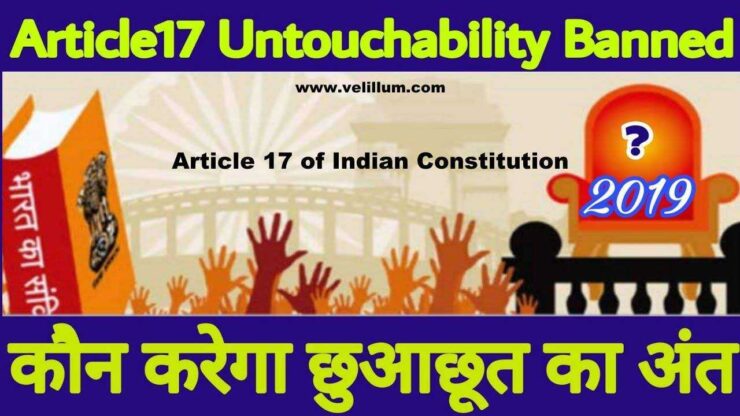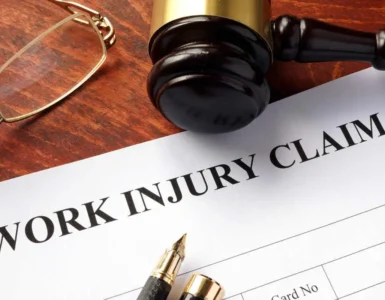Article 17 of Indian Constitution says:
The Article 17 of Indian Constitution enacts two declarations. Firstly, it announces that “Untouchability” is abolished and its practice in any form is forbidden, and secondly, it declares that the enforcement of any disability arising out of untouchability shall be an offense punishable in accordance with law.
Also, read: Top 4 reasons to choose WordPress for your business website
Article 17 of Indian Constitution explained:
It may be noticed that the word untouchability is enclosed in inverted commas. It indicates that the subject-matter of the article is not untouchability in its literal or grammatical sense, but the practice as it has developed historically in this country. The word, it is reasonable to suppose (you know which word we’re talking about here), refers to those, who are regarded as untouchables in the course of historical development. The literal construction of the term would include persons who are treated as untouchables either temporarily or otherwise for various reasons, such as their Suffering from an epidemic or contagious disease or on account of social observation that are associated with birth or death, or on account of social boycott resulting from caste or other disputes. Most of the time husband gives divorce or boycotts his wife because of untouchability. The imposition of untouchability in such circumstances has no relation to the causes which relegate certain classes of people beyond the pale of caste estimate. Article 17 of Indian constitution is against any forms of untouchability, and there are strict laws for those who try to go against “Article 17 of Indian Constitution”. (If the person is involved in domestic violence too, then Section 125 is imposed on him as well. Read more about Section 125 or Domestic Violence act here.)
Much that will fall within the purview of this article is already covered by the Article 15. Thus on the grounds of Article 17 of Indian Constitution no person can be denied access to shops, public restaurants, hotels and places of public entertainment or the use of wells, tanks, bathing ghats, roads and places of public resort, maintained wholly or partly out of the State funds or dedicated to the use of general public. These are the major instances of the form in which untouchability is practiced in this country (We’re talking about India here). But there could as well be other forms of social disability connected with untouchability, for instance, there can be discrimination against them in regard to the use of utensils and other articles kept in any public restaurant, hotel, dharamshala, etc. for the use of the general public or the practice of any profession or the carrying on of any occupation, trade or business or the enjoyment of any benefit under a charitable trust created for the benefit of the general public or the construction, acquisition or occupation of any residential premises in a locality or the observance of any social or religious custom, usage or ceremony or taking part in any religious procession or the use of jewellery and finery. The Constitution now forbids all these practices. For the effective enforcement of the declaration contained in this article, the Constitution contemplates penal laws specifying various acts which are to be prohibited and penalized. According to the Article 35 of the Constitution, Parliament alone is given the power to make laws for prescribing punishments for such acts. This is to bring about uniformity in such laws in the various States in the Union. Article 35 operates primarily as a restriction on the legislative power of the States, and since the Constitution is prospective in its operation, it does not render any existing criminal law forbidding the practice of untouchability void. Thus in State v. Gulab Singh“, the Allahabad High Court was asked to hold the UP. Removal of Social Disabilities Act, 1947, ultra vires the Constitution since it dealt with a matter which was reserved for Parliament under Article 35. The High Court rejected the contention and held that Article 35 refers to future laws and does not render past laws in the matter void.
There is, it should be noted, a fundamental difference between excluding persons from temples open for the purpose of worship to the Hindu public in general on the ground that they belong to the excluded communities, and prohibiting persons from denominational temples on the ground that they are not objects within the benefit of the foundation. The former will be hit by Article 17 of Indian Constitution, and the latter protected by Article 15.
In 1955 Parliament, in the exercise of the power conferred under Article 35, enacted the Untouchability (Offences) Act, 1955. This Act prescribed punishment for the practice of untouchability and the enforcement of any disability arising from there. However, it was found that the punishments awarded under the Untouchability (Offences) Act, 1955 were thin and inadequate. In 1965, a Committee on Untouchability, Economic and Educational Development of the 5C3 was appointed to examine the working of the Act and to make suitable recommendations for its amendment. On the recommendation of the Committee, a bill to amend the Act was introduced in 1972 and was passed in 1976, which renamed the Act as the “Protection of Civil Rights Act, 1955”. In the amended Act the expression “Civil Rights” has been defined as any right accruing to a person because of the abolition of untouchability under ‘Article 17 of Indian Constitution’. The amended Act also made significant changes in the existing law, namely, all offences to be treated as non-compoundable and offences punishable up to three months to be tried summarily; punishment of offences enhanced; a civil servant showing negligence in the investigation of offences to be punished as an abettor; privately owned places of worship brought within its purview; preaching of untouchability or its justification was made an offence; the State Governments empowered to impose collective fines on the inhabitants of an area involved in or abetting the commission of offences; and a machinery envisaged for better administration and enforcement of its provisions.
Article 17 Case Law
In State of Karnataka v. Appa Balu Ingale, the first case to have come before the Supreme Court under the Act, the court upheld the conviction of the accused-respondents by the two lower courts but reversed by the High Court. Disagreeing with the assessment of evidence by the High Court that there was a discrepancy in the evidence of the witnesses about the actual words used by the accused, the court noted that the ”High Court lost sight of the fact that the social disability of the Harijan community was enforced on a threat of using a gun. The opinion is going into the sociological agenda for untouchability and the constitution wants to resolve the differences. K. Ramaswamy said that the evil is not found on intention, and in appreciating the evidence the courts should adopt a psychological approach and should not be influenced by deep-seated prejudices or predilections covertly found in other walks of life about this evil.
Hope you like our work. Please, let us know your thoughts on the article via the comments section below. And, for more such informative articles, stay tuned with Velillum.
———-
Disclaimer
All the information provided in the article is to our best of knowledge on the subject. We hold no responsibility, whatsoever, in case of any disparency in the information provided. You could let us know through the comments section or by contacting us through our Contact Us page if you feel anything mentioned above is wrong. Our team of writers try their best to provide the correct information always with a unique choice of words to deliver the information correctly to you. However, we take no guarantee for it and you’re completely free to trust or ignore the information provided in the article.




























